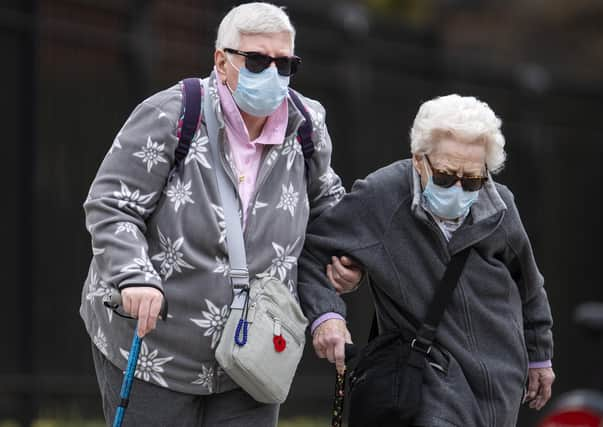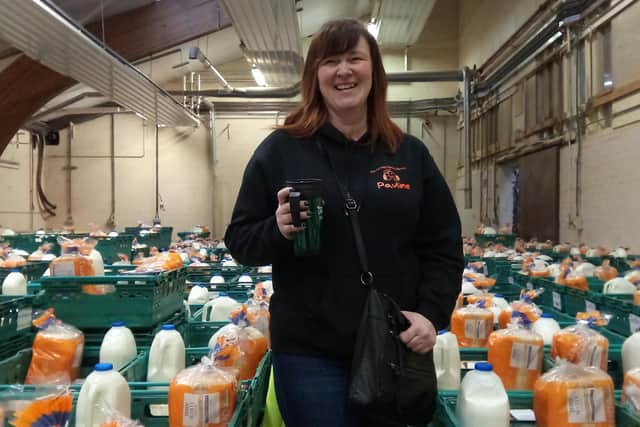Poverty & Covid-19: New report highlights the virus’ impact on Fifers in deprivation


The blueprint, which features NHS figures up to April 16, shows that of the 73 people in Fife who passed away due to Covid-19, 23 per cent lived in areas which had the highest levels of deprivation.
And 15 per cent of coronavirus deaths came from the least poverty-stricken areas.
Advertisement
Hide AdAdvertisement
Hide AdThe information was in a briefing sent recently to local councillors.


You might also be interested in:
By April 22, there had been a total of 85 confirmed and suspected Covid-19 deaths of Fife residents in all settings – hospitals, care homes and the community.
The majority (59 per cent) occurred in hospitals, and 27 per cent in care homes; figures roughly in line with the rest of Scotland.
Advertisement
Hide AdAdvertisement
Hide AdThree quarters of those who died were aged aged 75 or over – 55 per cent were male and 45 per cent female.
Pauline Buchan, service manager of the Cottage Family Centre in Templehall, which helps the most vulnerable children and families in Kirkcaldy, believes there are a number of reasons why people in disadvantaged areas are more susceptible to coronavirus.
She said: “People who are in more deprived areas have more social problems.
“They normally live in housing which isn’t great, with not very much money and, therefore, they don’t eat the right foods because they can only live off what they have,” she explained.
Advertisement
Hide AdAdvertisement
Hide Ad“They don’t access the health care system as we do because they have other issues going on as well – mental health problems or they have become really isolated because they feel really vulnerable, so they don’t mix with people the same. “
But, Pauline says the biggest contributing factor is diet.
She continued: “If you don’t eat well then you are going to be at greater risk of picking things up because you don’t have the same level of immunity – you aren’t looking after your body as well as you should be.
“What we normally give out in a food parcel is a short term fix for somebody - it isn’t a long term diet.
“You can’t live on that.
“Parents and kids need nutritional meals and they need to get all their vitamins.
Advertisement
Hide AdAdvertisement
Hide Ad“What is happening is, not just because of Covid-19, but also because of Universal Credit and people just struggling to make ends meet, food is becoming the thing that people spend less on.
“They end up eating food which has no or very little nutritional value, or they skip meals.
“If you live like that on a week to week basis, all you are doing is weakening your immune system.”
Diet is also important to elderly people’s good health.
Pauline continued: “If they dont have anyone to make meals for – if, for example, they are on their own – they will eat less.
Advertisement
Hide AdAdvertisement
Hide Ad“Some parents are making sure their children are fed but don’t have enough for themselves so they are missing meals.”
Pauline said as well as the physical impact, not eating the right food also has an effect on mental health.
“If you aren’t eating the right stuff or skipping meals then this affects your mental health as well because you become more tired, you have less energy and if you go for a period of time like that, it will have an effect.
“Along comes a virus – any virus – and you are left much more susceptible as your body doesn’t have the same capacity to fight it.
“Food is a massive factor for all age groups.
Advertisement
Hide AdAdvertisement
Hide Ad“We all know there is a problem and that there are people living hand to mouth and have all these other issues going on.
“But what are we actually doing about it?
“It should not take for a virus to come along for governments to really look at this and do something.”
As a result of the lockdown, there have been locals who have never accessed the Cottage’s services before.
The team which runs the frontline community hub has 141 families currently registered, but it is giving out three times more than it would normally.
Advertisement
Hide AdAdvertisement
Hide AdAdded Pauline: “During the Easter and summer holidays we would usually give out between 300 and 400 packed lunches a week, but at the moment we are giving out over 1000 so the problem is massive.”
She continued: “This is the chance to really make a difference.
“We are all human beings at the end of the day, and bold decisions need to be made about how we can change people’s lives for the better. Putting people’s money up by £5 or £10 a week isn’t enough.
“Going forward, after this crisis is over, I think we really need to look at why we have had all of these deaths.
“We need to ask: why are they in the most deprived areas?
“What is it that has made that happen?
Advertisement
Hide AdAdvertisement
Hide Ad“And what are we going to do to try and make sure it doesn’t happen again.”
Meanwhile, the chairman of Kirkcaldy Foodbank has backed the value of a balanced, nutritional diet.
Volunteers at Kirkcaldy Foodbank have been working tirelessly to help those who need the service during the pandemic.
Joyce Leggate, who chairs the organisation, said: “We appreciate the value of a balanced, nutritional diet and our food parcels are designed to offer this. Where we have fresh produce available we distribute that in preference to tinned items.
Advertisement
Hide AdAdvertisement
Hide Ad“We have been able to increase our availability of fresh fruit and vegetables since our move to Viewforth Hall and this is available across our venues.
“We also have regular supplies of frozen foods to compensate when fresh items are not available.”